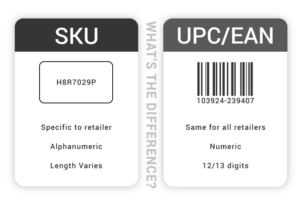In the world of retail and e-commerce, inventory management is a critical aspect that can significantly impact a business’s success. Among the various tools and techniques available, SKUs (Stock Keeping Units) play a pivotal role. In this blog post, we will delve into what SKUs stand for? Their importance, and practical tips for using them efficiently in your store.
What does SKU stand for?
Table of Contents
Before we dive into the intricacies of SKUs, let’s clarify what SKU number meaning? SKU stands for “Stock Keeping Unit.” Essentially, it is a unique alphanumeric code assigned to each distinct product in your inventory. This code serves as an identifier and helps you keep track of individual items, making it easier to manage, locate, and sell products.

Source: CodeREADr
SKUs, UPCs, and EANs.
While discussing SKUs, it’s essential to mention UPCs (Universal Product Codes) and EANs (European Article Numbers) as they are closely related. They are all product identification codes used in the retail and e-commerce industries, but they serve different purposes and have distinct characteristics. Let’s compare these three types of codes
SKUs(Stock Keeping Units) |
UPCs(Universal Product Codes) |
EANs(European Article Numbers) |
|
Purpose |
SKUs are internal product identifiers used by retailers to manage their inventory efficiently. They are specific to each individual store or business and help distinguish between different product variants within the same inventory. | Global retailers, wholesalers, and point-of-sale systems recognize UPCs as standardized product identifiers that facilitate efficient scanning and tracking of products at the point of sale. They are designed for universal use to streamline the process. | EANs are also standardized product identifiers, like UPCs, but they are primarily used in Europe and other international markets. EANs are part of the Global Trade Item Number (GTIN) system, ensuring global product identification and compatibility. |
Format |
SKUs are typically alphanumeric and can vary in length, depending on the retailer’s preference and the complexity of their inventory system. They often incorporate meaningful information, such as product category, variant, or location. | UPCs are numeric and consist of a series of black bars and white spaces that are scannable by barcode scanners. The standard UPC format is 12 digits, although there are variations with 8, 10, or 13 digits for specific applications. | EANs are also numeric and use the same barcode format as UPCs. The standard EAN format is 13 digits, which includes a country code, a manufacturer code, and a product code. |
Scope |
SKUs are specific to each retailer or business and are not standardized across different organizations. The same product in two different stores may have different SKUs. | UPCs are universal and standardized across the entire retail industry. This standardization ensures consistency in product identification and seamless transactions. | Like UPCs, EANs are standardized and globally recognized. They are widely used in Europe and other international markets, providing compatibility and ease of product identification worldwide. |
Application |
Within a specific retail operation, SKUs mainly serve the purposes of internal inventory management, stock tracking, and order fulfillment. | UPCs and EANs are used for point-of-sale scanning, supply chain management, product tracking, and international trade. They facilitate smooth transactions between retailers, distributors, and manufacturers. | |
In summary, What does SKU mean on marketplace? SKUs are internal identifiers used for inventory management within individual stores, while UPCs and EANs are standardized product identifiers designed for universal use and seamless transactions across the retail industry and international markets. Each of these codes plays a crucial role in the efficient functioning of retail and e-commerce operations, ensuring accurate product identification, streamlined inventory management, and enhanced customer experiences.
Why Are SKUs Important?
SKUs are essential tools that provide a structured and efficient way to manage inventory, track sales, and improve overall operational efficiency for retail and e-commerce businesses, especially for e-commerce sites on the Magento platform. Moreover, they contribute to accurate inventory management, streamlined order fulfillment, and valuable sales analysis, enabling businesses to stay competitive in today’s dynamic marketplace. Here are some key reasons why SKUs are important.
-
Accurate Inventory Management
SKUs streamline inventory management by providing precise identification for each product. This prevents confusion, reduces the risk of stockouts or overstocking, and enhances overall inventory accuracy.
-
Efficient Order Fulfillment
With unique SKUs, order processing becomes more efficient. So, you can quickly locate products in the warehouse and fulfill customer orders accurately, leading to improved customer satisfaction.
-
Sales Analysis
SKUs allow you to track the performance of individual products and categories. Thus, this data enables you to identify high-performing items, assess demand patterns, and make informed decisions about your product assortment.
-
Enhanced Reporting
Incorporating SKUs into your sales and financial reports provides a detailed view of your business’s performance. This level of granularity empowers you to identify areas of improvement and capitalize on profitable opportunities.
In Magento, SKUs are vital for efficiently managing product inventory in online stores. Create unique and meaningful SKUs with alphanumeric characters, avoiding special characters and spaces. Besides, integrating Magento with inventory management systems can enhance inventory control and order processing efficiency, contributing to a seamless shopping experience for customers.
Don’t skip the material below if you’re looking for another practical and simple-to-use solution with more comprehensive capabilities for your Magento 2 store: Magento 2 Quick Order Extension by SKU
Tips for Using SKUs Efficiently
Using SKUs efficiently is crucial for effective inventory management and streamlined operations in retail and e-commerce businesses. Here are some helpful pointers to assist you maximize your SKU system.
-
Develop a Logical System
Create a consistent and logical SKU system that aligns with your business needs. Consider incorporating information such as product category, variant, or location in the code to facilitate quick identification.
-
Keep SKUs Unique
Make sure your SKUs are unique and do not overlap. Ambiguous or duplicated SKUs also can lead to confusion and hinder efficient inventory management.
-
Organize SKUs by Categories
Categorize your products and assign unique prefixes or codes for each category. So, this approach makes it easier to navigate through your inventory and analyze sales performance for specific product groups.
-
Integrate SKUs with Your Inventory Management System
Utilize a robust inventory management system that can handle and process SKUs efficiently. Besides, the integration will help automate inventory tracking, order processing, and reporting, saving time and reducing the risk of manual errors.
-
Regularly Review and Update SKUs
As your product offerings evolve, regularly review and update your SKU system. Moreover, incorporating this ensures appropriate integration of new products and retirement of obsolete ones.
-
Train Your Team
Educate your staff on the importance of SKUs and how to use them effectively. Also, provide guidelines and best practices for generating and managing SKUs to ensure consistency and accuracy throughout the organization.
-
Use Barcoding Technology
Implement barcoding technology to scan and track products quickly and accurately. Barcodes associated with SKUs enable efficient inventory control and reduce the likelihood of human errors during order fulfillment.
-
Analyze Sales Data
Leverage the data collected through your SKU system to analyze sales performance. Additionally, identify top-selling products, slow-moving items, and trends to make informed decisions about inventory replenishment and marketing strategies.
-
Optimize Reporting and Analytics
Use your SKU data to generate comprehensive reports and analytics. And, gain insights into sales trends, customer preferences, and product performance, enabling you to make data-driven decisions for your business.
By following these tips, you can optimize your SKU system, improve inventory management, and enhance the overall efficiency of your retail or e-commerce operations. Efficient use of SKUs ultimately leads to better customer experiences, increased sales, and improved profitability for your business.
Conclusion
In conclusion, understanding and utilizing SKUs can significantly benefit your store’s efficiency and profitability. These unique identifiers streamline inventory management, enhance order fulfillment, and provide valuable insights into your sales performance. By implementing a well-thought-out SKU system and training your team to utilize it efficiently, you can take your inventory management to the next level and drive your store’s success in the competitive retail landscape.
